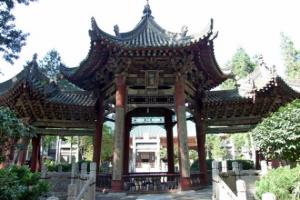Belt and Road Initiative Project to Boost Transport in Northwest Region
Construction of Asia's highest tunnel in elevation, located in Northwest China's Qilian Mountains, is progressing smoothly with 45 percent of the job done. The tunnel would link Gansu and Qinghai provinces when completed in October 2020.
The Dongshan Tunnel, part of the Sunan-Qilian section within the G213 national highway, will help traffic flow between the Sunan Yugur autonomous county in Gansu and Qilian county in Qinghai.
A key project in the Belt and Road Initiative, the 3,639-meter-long tunnel is being built by the First Engineering Co Ltd of China Tiesiju Civil Engineering Group (CTCE), project safety director Li Huping said.
The Qilian Mountains stretches for over 1,000 kilometers at the south of the Hexi Corridor - a main artery on the ancient Silk Road. It has an average elevation of 4,500 meters, with many ridges piercing high into the sky.
The Sunan-Qilian Highway starts at Baizhuangzi in Sunan and ends at the S215 provincial highway in Qinghai. It has a total investment of 1.4 billion yuan ($200 million). It will save travelers between Sunan and Qilian more than 400 kilometers on the road and cut their transport time by five hours, said Li.
Li said after entering the region in March last year for preparation work, they started digging the tunnel in June 2018. They intend to finish the whole construction by October 2020 and make it a key transport artery in China's northwest.
Li added they are building the No 5 bid (15.01 kilometers long) of the highway, covering roadbeds, bridges and culverts, of which the Dongshan Tunnel is the most difficult project. Their section alone costs 496 million yuan.
Sunan is home to the Yugur ethnic group and belongs to Zhangye city, which was once called Ganzhou prefecture and was one of the biggest international trading markets on the ancient Silk Road.
He said the tunnel has an elevation of some 4,000 meters with unstable geologic conditions and very high risks when it comes to digging and construction.
With an annual average temperature of around minus 10 degrees Celsius and frozen soil as deep as 1.8 meters, Li said the project reminded people of the Qinghai-Tibet Railway, a previous project that CTCE staff helped to build on that plateau.
In June 2001, the CTCE builders, led by Chief Director Zhang Hechuan, became a main force in construction at the harsh zone of Kekexili in Tibet. At an elevation of over 4,700 meters, they accomplished their task successfully, spurring a spirit in the company of overcoming difficulties with daring and hard work.
The Dongshan Tunnel is now the first plateau tunnel for the CTCE builders, Li said.
Zhang, who is now chairman of CTCE, paid a visit to the tunnel on Nov 22, inquiring about the difficulties facing the construction team and calling on them to build a quality project.
Li said since March of last year, they had no running water, no electricity and no mobile communication for almost four months due to the high elevation. The area also caused headaches, dizziness, nausea, vomiting and tinnitus to new workers there.
To ensure the safety of employees, Li said they hired a local doctor to treat the workers.
Ma Zhizhen, deputy manager of the project department from CTCE, recalled: "As it is impossible to dig wells for water, we had to take water from ditches one kilometer away."
Chen Taiheng, Party secretary of the project department, said he was pleased at their progress. Besides the 60 managerial staff, they also had some 300 workers. They equipped the workers with heating equipment and cold-proof materials, creating a "warm home" for them in this harsh environment.
Zhao Changping, a 45-year-old native of Yunyang county in Chongqing, said as a CTCE employee, he can earn a monthly salary of 12,000 yuan, which is a boon for his wife and their three children aged 17, 10 and eight years old respectively.














